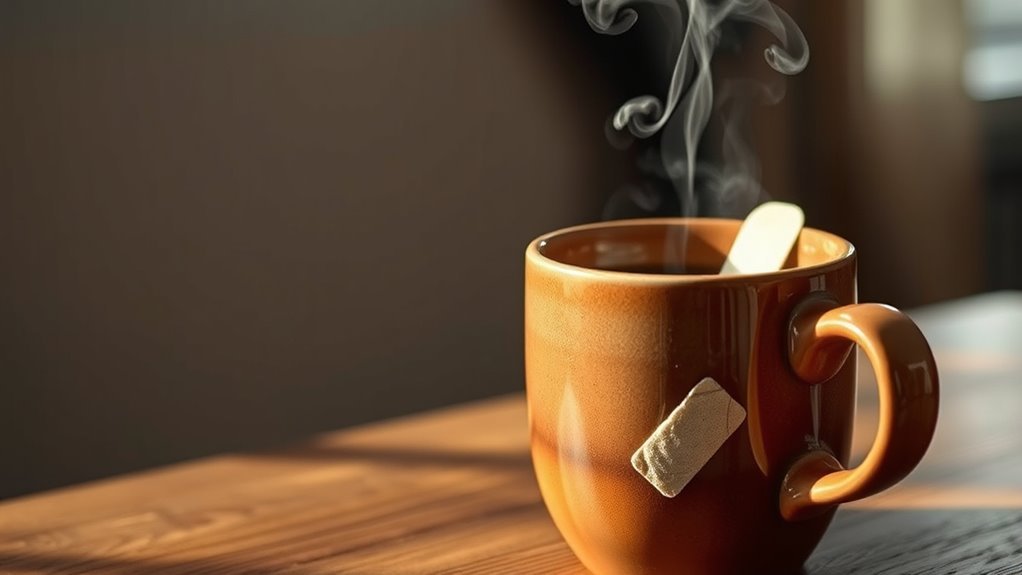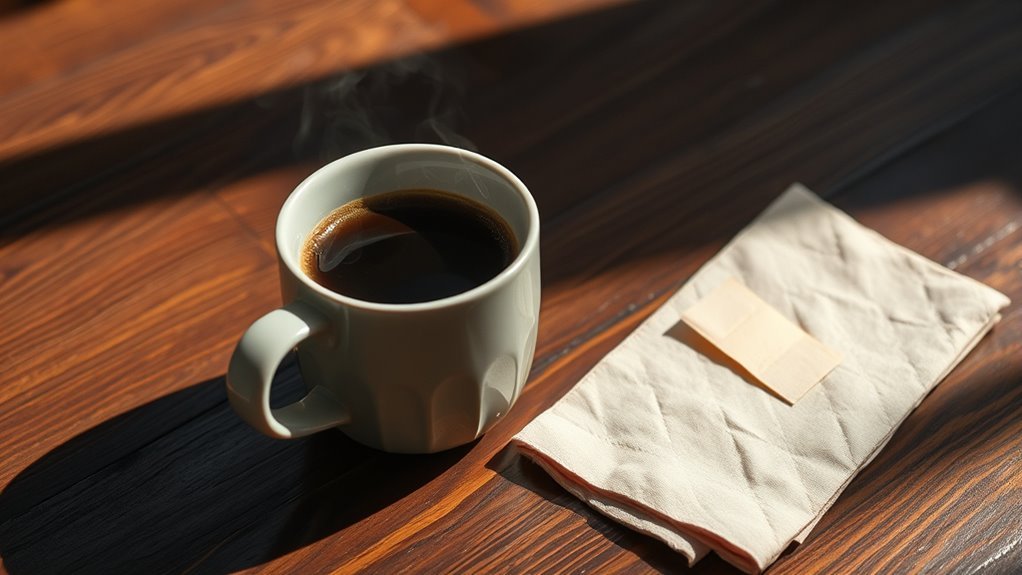Can I Drink Warm Coffee After Tooth Extraction
You shouldn’t drink warm coffee right after tooth extraction. Warm beverages can disrupt clot formation and increase discomfort at the extraction site. It’s best to wait at least 48 hours before introducing any coffee, starting with lukewarm options. This helps your gums stabilize and reduces complications. Pay attention to how you feel when reintroducing coffee. There’s more to learn about managing your recovery effectively and ensuring a smooth healing process.
Understanding Tooth Extraction Recovery

When you undergo a tooth extraction, understanding the recovery process is essential for a smooth healing experience. Your recovery timeline typically spans several days, during which you’ll notice various stages of tooth healing. Initially, you might experience swelling and discomfort, which should gradually subside within a few days. It’s important to manage pain and follow your dentist’s recommendations for medications. By day three, most people notice significant improvement, while complete healing can take up to a couple of weeks. During this time, sticking to soft foods and avoiding strenuous activities can aid in your recovery. Being aware of these aspects helps you navigate your post-extraction journey with greater confidence, ultimately leading to a healthier outcome.
The Importance of Post-Operative Care
Post-operative care is essential for a smooth recovery after a tooth extraction. You’ll need effective pain management strategies to minimize discomfort, as well as dietary restrictions to promote healing. Following these guidelines helps guarantee a safe and successful recovery process.
Pain Management Strategies
Effective pain management is essential for a smooth recovery after tooth extraction, as it not only alleviates discomfort but also promotes healing. Here are some effective pain relief techniques and medication management strategies you can consider:
- Over-the-Counter Pain Relievers: Use ibuprofen or acetaminophen as directed to manage pain and reduce inflammation.
- Cold Compress: Apply a cold pack to your cheek for 15-20 minutes to minimize swelling and numb the area.
- Rest: Give your body time to heal by resting and avoiding strenuous activities for a few days.
- Follow Instructions: Adhere to your dentist’s post-operative care guidelines to guarantee proper healing.
Dietary Restrictions Post-Extraction
Following a tooth extraction, what you eat can greatly impact your recovery process. It’s vital to implement dietary modifications to guarantee proper healing. In the initial days post-extraction, stick to soft foods that require minimal chewing. Think mashed potatoes, yogurt, smoothies, and soups—these options are not only gentle on your healing gums but also provide necessary nutrients. Avoid hard, crunchy, or spicy foods, as they can irritate the extraction site and hinder recovery. Additionally, steer clear of hot beverages, like warm coffee, for a few days to prevent discomfort. By choosing the right foods, you can support your body’s healing efforts and enjoy a smoother recovery experience. Remember, your diet plays a pivotal role in your overall health post-extraction.
Effects of Temperature on Healing

While it’s tempting to enjoy a warm cup of coffee after your tooth extraction, temperature can greatly influence the healing process. Your body’s response to temperature sensitivity can affect recovery, so it’s important to evaluate a few factors:
After tooth extraction, be cautious with warm beverages as they can impact healing.
- Inflammation: High temperatures may increase swelling in the extraction site.
- Blood Flow: Warm beverages can enhance blood flow, which might disrupt clot formation.
- Pain Sensitivity: Extreme temperatures can heighten discomfort during the initial healing phase.
- Healing Time: Maintaining a stable temperature can lead to a more efficient healing process.
When to Resume Drinking Coffee
Once your dentist gives the green light, you can start enjoying coffee again, but it’s essential to wait until your mouth has healed sufficiently. Generally, it’s best to hold off on drinking hot coffee for at least 48 hours post-extraction. This allows your gums to stabilize and reduces the risk of complications. When you do resume, consider starting with lukewarm coffee to avoid irritation.
Alternatives to Warm Coffee

If you’re looking for alternatives to warm coffee after a tooth extraction, there are several options that can satisfy your caffeine cravings without risking irritation to your healing gums. Here are some great coffee substitutes and herbal teas you can enjoy:
- Decaffeinated coffee – Enjoy the familiar taste without the caffeine kick.
- Chicory root coffee – A popular coffee alternative with a similar flavor profile.
- Matcha tea – Packed with antioxidants and a gentle caffeine boost.
- Herbal teas – Opt for caffeine-free varieties like chamomile or peppermint for soothing effects.
These alternatives can provide comfort and satisfaction, allowing you to maintain your routine while prioritizing your recovery.
Tips for Enjoying Coffee Safely
To enjoy coffee safely after your tooth extraction, it’s vital to contemplate a few key factors that can aid in your recovery. First, wait at least 24 hours before resuming coffee to allow your body to begin healing. If you opt for warm coffee, make sure it’s at a moderate temperature to avoid irritating the extraction site. Consider exploring coffee alternatives like herbal teas or decaffeinated options, which can be gentler on your mouth while still providing comfort. Always stay hydrated, as this is essential for recovery. Finally, listen to your body; if you experience discomfort, it’s wise to pause your coffee consumption. These recovery tips will help you enjoy your favorite beverage safely and comfortably.
Recognizing Signs of Complications

While enjoying your coffee post-extraction can be comforting, it’s important to stay vigilant for any signs of complications that may arise during your recovery. Recognizing these symptoms early can help guarantee a smooth healing process. Watch for the following:
- Swelling Indicators: Excessive swelling that doesn’t improve after a few days may signal a problem.
- Infection Signs: Pus or foul-smelling discharge from the extraction site is a clear warning.
- Persistent Pain: Pain that worsens instead of improving could indicate complications.
- Fever: A fever may indicate an underlying infection that needs immediate attention.
If you notice any of these signs, contact your dentist promptly to address the issue and avoid further complications.
Hydration and Its Role in Recovery
Staying well-hydrated is essential for your recovery after a tooth extraction, as it helps facilitate the healing process and reduces the risk of complications. Proper hydration benefits your body by promoting effective nutrient delivery to the surgical site and maintaining fluid balance, which is vital for peak recovery. When you’re hydrated, you’re also less likely to experience discomfort or swelling. Aim to drink plenty of water throughout the day, avoiding caffeinated or alcoholic beverages initially, as they can lead to dehydration. Remember, good hydration supports your immune system, helping you fend off infections as you heal. So, keep that water bottle handy, and prioritize drinking fluids to guarantee a smoother recovery journey.
Consulting Your Dentist for Personalized Advice

After a tooth extraction, it’s essential to consult your dentist for personalized advice on your post-extraction care. They can guide you on the appropriate beverage temperatures and what signs to monitor during your recovery. Tailoring your recovery plan to your specific needs can help guarantee a smoother healing process.
Importance of Post-Extraction Care
Since each tooth extraction is unique, it’s vital to consult your dentist for personalized advice on post-extraction care. Proper post-extraction hygiene is important to guarantee a smooth recovery and prevent complications. Here are some key points to take into account for your oral care:
- Follow prescribed instructions: Adhere to your dentist’s guidelines regarding medication and care.
- Maintain cleanliness: Gently rinse your mouth with salt water after 24 hours to keep the area clean.
- Avoid certain foods: Steer clear of hard, crunchy, or spicy foods that may irritate the extraction site.
- Monitor healing: Keep an eye on any unusual symptoms, such as excessive bleeding or swelling, and contact your dentist if needed.
Recommended Beverage Temperatures
While it may be tempting to enjoy a warm cup of coffee after your tooth extraction, it’s vital to take into account the temperature of your beverage. After the procedure, your mouth may experience some oral sensitivity, making it important to avoid extremes in beverage temperature. Ideally, stick to lukewarm drinks that won’t irritate your healing gums or the extraction site. Beverages that are too hot can cause discomfort and potentially hinder the healing process. Always consult your dentist for personalized advice on what temperature is best for you. They can provide tailored recommendations based on your specific situation and recovery needs. Taking these precautions will help guarantee a smoother recovery while allowing you to enjoy your favorite drinks safely.
Signs to Monitor
It is essential to monitor your recovery closely, as certain signs can indicate complications following a tooth extraction. Keep an eye on the following indicators:
- Pain Indicators: If your pain worsens or persists beyond a few days, it may signal a problem.
- Swelling Signs: Noticeable swelling that doesn’t improve after 48 hours could indicate an infection.
- Bleeding: Continued bleeding or excessive bleeding after the first day should be addressed immediately.
- Fever: A fever may suggest an underlying infection and should prompt a call to your dentist.
If you notice any of these signs, don’t hesitate to consult your dentist for personalized advice. Staying informed helps guarantee a smooth recovery and peace of mind.
Frequently Asked Questions
Can I Drink Coffee if I Have Stitches After Extraction?
Did you know that nearly 85% of people experience some discomfort after dental extractions? If you’ve got stitches, it’s essential to prioritize post extraction care. Drinking coffee might irritate your healing gums, especially if it’s hot. It’s best to wait until you’re fully healed to avoid complications. Focus on maintaining good oral hygiene during this time, and opt for cooler beverages that won’t affect your recovery. Your comfort matters!
What Types of Coffee Should I Avoid After Extraction?
After a tooth extraction, you should avoid coffee types that can irritate your gums or interfere with pain management. For instance, skip overly hot coffee, as it could cause discomfort. Additionally, steer clear of sugary or acidic coffee drinks that may compromise oral hygiene. Opt for mild, lukewarm options if you crave coffee, ensuring you maintain a gentle approach to your recovery. Remember, prioritizing your healing is essential for a smooth recovery process.
How Long Should I Wait Before Drinking Hot Beverages?
Before sipping steaming sips, it’s essential to reflect on your healing process. After dental work, you should wait at least 24 hours before indulging in hot beverages. Too high a beverage temperature can disrupt your recovery and even cause discomfort. Allow your mouth to heal properly; patience pays off. Focus on soothing, lukewarm options during this time to promote comfort and recovery, ensuring your mouth remains free from complications.
Can Warm Coffee Affect My Blood Clot Formation?
Warm coffee, like other warm beverages, can potentially impact blood clot safety after a dental procedure. The heat may cause discomfort or irritation, which could disrupt the healing process. It’s generally advised to avoid hot drinks for the first few days to guarantee proper clot formation. Moderating the temperature of your beverages can help promote healing, allowing you to enjoy your drinks without risking complications. Always consult your dentist for personalized advice.
Is Caffeine Safe During the Recovery Period?
You’re in the thick of recovery, and the allure of caffeine consumption is tempting. But wait—caffeine can lead to dehydration, which isn’t ideal when your body’s healing. While moderate amounts might be okay, it’s best to follow recovery tips like staying hydrated and avoiding excessive intake. Listen to your body; if you feel unsure, reach out to your dentist for personalized advice. Your comfort and healing should always come first.






